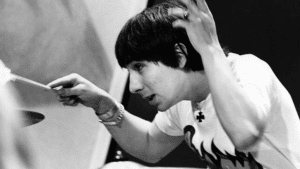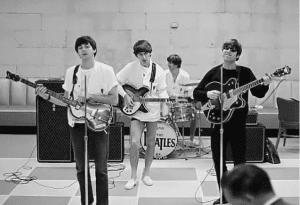The Reason The Rolling Stones Gave Away Their First Song

via The Howard Stern Show/ YouTube
Roughly 50% of the Rolling Stones’ output can be regarded as revolutionary in the realm of rock music.
While The Beatles made an immediate global impact upon landing in America for The Ed Sullivan Show, the Rolling Stones served as a rebellious response, either performing blues covers or crafting songs that parents would prefer their children not to hear.
Despite the impressive body of work they’ve amassed over the years, some of the band’s most influential material faced the risk of being overlooked during their formative years.
Probably one of their most fabled work was the first-ever product of the Mick Jagger-Keith Richards songwriting partnership, a little tune called “As Tears Go By” that the band gave away to Jagger’s muse, Marianne Faithfull.
The Rolling Stone’s turning point
During their formative years in the London club scene, the primary ambition of the Rolling Stones was to achieve mastery in the realm of blues. Brian Jones, the driving force behind the group’s inception in the early 1960s, laid the foundation for their entire ethos, initially centered around delivering unique interpretations of American blues compositions.
The band had even derived its name from an old Muddy Waters song, setting the stage for their musical journey. Upon the inclusion of Jagger as the vocalist and Richards as the guitarist, a transformative phase commenced, marking the band’s evolution into their iconic form. This transition was characterized by infusing a considerable amount of attitude into their blues anthems.
The Stones, recognizing the substantial financial potential in crafting original material, faced a turning point when manager Andrew Loog Oldham suggested that Jagger and Richards explore their talents in songwriting.
The shift from interpreting blues classics to creating original compositions not only marked a pivotal moment in the band’s artistic trajectory but also paved the way for them to become one of the most influential and enduring rock acts in history.
Giving away an iconic song
As recounted by Richards to Howard Stern, “[Oldham] told us, ‘Listen, guys, we can’t keep doing covers forever’. He locked Mick and me in a kitchen, insisting, ‘Come out with a song.’” Despite evolving into the preeminent songwriters of their generation, their initial lack of confidence in their compositions led them to generously give away many of their songs.
After receiving the song “I Wanna Be Your Man” from The Beatles, Jagger and Richards presented their first composition, “As Tears Go By”, to Marianne Faithfull, believing it wouldn’t align with the Rolling Stones’ style.
In contrast to the conventional approach of tailoring songs for their band, Jagger and Richards admitted that most of their initial compositions didn’t seem suitable for the band.
Elaborating on their creative process, Richards explained that many songs emerged through practice, stating, “We didn’t think [our songs] were any good at all. But at the same time, I think Andrew was giving us leeway to figure it out. Songwriting isn’t something that happens overnight. We were writing some of the pop crap because it’s easy”.
https://twitter.com/OfficialMBTM/status/1471476101809688579
A consistent philosophy in songwriting
Throughout this period of musical evolution, Richards meticulously crafted songs, aiming for a level of quality that warranted sharing with the rest of the band.
Following an extended exploration of pop songs, the songwriting duo eventually birthed “The Last Time”, a seminal composition that marked the band’s first major single crediting ‘Jagger-Richards’ in the liner notes.
Even in the present day, Richards adheres to a consistent philosophy when starting any songwriting process—a quest for material that seamlessly integrates with the Rolling Stones’ overarching vibe while steadfastly preserving their sonic identity.
Despite Richards possessing an innate ability to conjure riffs seemingly from the ether, his initial forays into songwriting served as compelling evidence of his mastery in crafting pop songs. Regardless of how frequently he engaged with his guitar, Richards remained acutely aware of the paramount importance of nurturing and exercising the creative muscle in his mind, a practice that has become integral to his enduring success as a songwriter.












